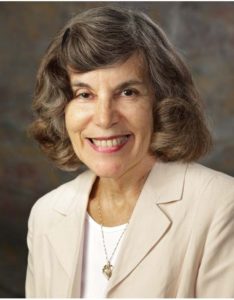Dorothy Stroh Becvar, PhD, past AAMFT Board Member and Approved Supervisor, LMFT, LCWS, NBCC, died at home on August 31, 2021, in St. Louis, Missouri. She is survived by her husband, Dr. Ray Becvar, and her daughter, Lynne Reif. She was preceded in death by her son, John S. Reif, Jr. It is with great pleasure and honor that we offer a tribute to her life as an academic professional, author, mentor, friend, and a strong, visionary leader in the field of mental health both in marriage and family therapy and social work for over 40 years.
 Dorothy’s BA was from Cornell University in the College of Arts and Sciences in 1963, and she received a degree in Education and Social Work from Temple University in 1978. Dorothy earned her MSW in the Graduate School of Social Service from St. Louis University in 1980. She went on further to earn her PhD in the Multidisciplinary Program in Family Studies from St. Louis University in 1983.
Dorothy’s BA was from Cornell University in the College of Arts and Sciences in 1963, and she received a degree in Education and Social Work from Temple University in 1978. Dorothy earned her MSW in the Graduate School of Social Service from St. Louis University in 1980. She went on further to earn her PhD in the Multidisciplinary Program in Family Studies from St. Louis University in 1983.
She accomplished her graduate degrees while married, raising her two young children, being active in their school’s PTA, active in her church membership, and working as adjunct instructor. Upon completing her PhD, she spent her career in academia teaching at University of Missouri-St. Louis, Department of Education, St. Louis University, Texas Tech University, Washington University, Radford University, Barnes-Jewish College of Nursing and Allied Health, and the School of Social Work, Saint Louis University. While at Radford, Dorothy developed a program to train students to deliver services to families in rural Appalachia. She loved being a wife and mother, teaching and training students, researching, writing, and serving as an administrator and colleague.
In addition to her work in universities, she also co-founded and directed the St. Louis Family Institute with her husband, Ray, and later The Haelan Centers. It was through the universities and her work as author, educator, and presenter that I and so many others have had the privilege to witness the professional as well as their loving relationship—Dorothy and Ray’s life became a demonstration of a pragmatic understanding of the principles they were so dedicated to teaching.
Dorothy made an enormous contribution to the helping professions in her research and writing, as well as continuous contributions of her time and energy to professional committees. She worked many years peer reviewing professional articles while serving as editor of Contemporary Family Therapy, AAMFT Supervision Bulletin, Qualitative Social Work Research and Practice and as editor of two special edition journals for the Journal of Family Social Work and Journal of Marriage and Family Therapy. She also served as ad hoc reviewer for Family Systems and Health, Brooks/Cole, Bruner/Mazel, Hamilton Press, Madison Books, Paragon Publications, Qualitative Social Work Research and Practice, and University Press of America.
Dorothy published over 80 peer reviewed journal articles, 28 of which were co-authored with her husband, Ray, 29 book chapters—four with Ray, two seminal texts in the field of marital and family therapy—eight editions of Family Therapy: A Systemic Integration, as well as Systems Theory and Family Therapy: A Primer, both co-authored with Ray. These two books have been used at 250 colleges and universities. She wrote six other books—three of which were co-authored with Ray. In addition, she wrote numerous reviews, forewords, and prefaces for others in the field. Further, she was for five years the editor of Contemporary Family Therapy. From 1976 to 2018, Dorothy made over 280 professional presentations. At AAMFT, she was a member of the Board of Directors and chair of the Standards Committee. On the international scene, she served on the Board of Directors of the International Family Therapy Association (IFTA) and chaired the International Accreditation Commission on Systemic Therapy Education. Her seemingly tireless efforts have and will continue to contribute greatly to our knowledge of the systemic paradigm in the helping professions, about the process of change in therapeutic work, and about life and living well.
Dorothy was a champion of the systemic paradigm for therapy. She was also passionate about research, writing and teaching on grief and loss, spirituality, and ethics in professional practice. In her book Soul Healing, she made the audacious suggestion that conversations in therapy might well include the spiritual part of client’s lives. Moreover, her thought on spirituality was always inclusive, seeking to connect and benefit adherents of all faiths and of none.
I greatly valued and appreciated her depth of knowledge and deep understanding on a wide variety of topics in the helping professions. While I was in my PhD program at another university, she agreed to serve on my dissertation committee. As I was realizing the limitations of what I knew about research and methods, as well as a number of other subjects, Dorothy easily (and graciously) guided and instructed me toward a fuller understanding. I found in that process, and in many other wonderful conversations both with her and about her with others, Dorothy was consistently the consummate educator and professional—she could lead strongly with skill in conversations and nurture the space within others toward an openness to ideas and visions she held dear.
Dorothy modeled for others what she held important as an academic and professional. She was affiliated with 13 organizations, in five of which she held leadership positions. She received numerous awards for her dedication to helping families both in the community and professional organizations in which she served. She challenged me toward my own professional interests and ideas and collaborated in conversations where there were overlapping areas of study. She was curious and continually learning both from those she taught, through over 40 additional trainings, and participation in conferences.
That she had a strong work ethic may be understated when reviewing her accomplishments, however my interactions with her over the years were consistently relationship-centered. While projects and work may have been the organizing purposes for certain connections, I always felt her warmth and caring. I greatly admired her courage and ability to see others as complete and whole and simultaneously learning and growing—she infused hope and gratitude into each conversation. I learned perseverance in her life story and work. I learned about love and commitment in her relationship with her husband, family, and friendships.
In the last few years, after her retirement from academia, she continued her professional activities as therapist, author, and teacher. She founded The Haelan Centers, a non-profit therapy center as a memorial to her son, John, who lost his life in an accident many years before. She saw in The Haelan Centers a vision for facilitating health and wholeness in others through the sharing of knowledge about, as well as supporting, the processes of accessing and utilizing the inherent ability of all persons to heal themselves. In conversations with her in the last couple of years, as she sought a fuller retirement, I was chosen to continue her work and continue The Haelan Centers’ vision under my direction.
It seems appropriate that Dorothy continues to teach us, even now, how best to carry the weight of her loss. In a chapter entitled “Reclaiming Joy,” Dorothy develops her concept of accepting loss as “living at two levels,” which means “opening up new parts of the self, or allowing new aspects of the self to emerge, in order to accommodate the loss and all it entails … as one accepts a both/and perspective which acknowledges both sorrow and joy, one lives in awareness of the two levels that define the inevitable and basic paradoxes of life” (2001, pp. 256-257).
I am deeply saddened by the passing of a wonderful human being, a mentor to thousands, and my friend. I and thousands of other will continue to use her loving wisdom and her strength in our lives. My connection to her was a blend of personal and professional. She was someone from whom I could seek perspective and personal advice that was without exception knowledgeable and wise. She knew my wife and my children and was always loving and warm to them. Dorothy, I will miss our conversations and will forever have your example of a life story well-lived.
 Aaron S. Cohn, PhD, is an AAMFT Professional Member holding the Clinical Fellow designation and Clinical Supervising Faculty at the Family Institute at Northwestern University.
Aaron S. Cohn, PhD, is an AAMFT Professional Member holding the Clinical Fellow designation and Clinical Supervising Faculty at the Family Institute at Northwestern University.
Other articles
Bridging the Divide: Creating Respectful Dialogue
We live in a divisive world. So much of what we see and hear as part of the socio-political narrative is filled with argument and contention that polarizes discussion, ideas, and sometimes even people.
Benjamin Erwin, PhD
Healing Systems: Therapy with Mandated Clients
Mandated clients are often navigating many systems at once. These systems include their families, their schools, the Department of Juvenile Justice (DJJ)/Juvenile Services Department (JSD), etc. In addition to navigating multiple systems, mandated clients may be experiencing levels of trauma (or Adverse Childhood Experiences – “ACEs”), individually or within the family system.
Edmound M. Davis, MS and Franchesca Meyers, MS
Times Are Changing
It has been 12 years since Montana, as the last state, obtained licensure (literally days behind West Virginia). Since that time, AAMFT has worked with divisions and more recently, Family TEAM to strengthen the license throughout the United States.
Tracy Todd, PhD
 Johnny Faulkner, PhD, Director, The Haelan Centers.
Johnny Faulkner, PhD, Director, The Haelan Centers. 

